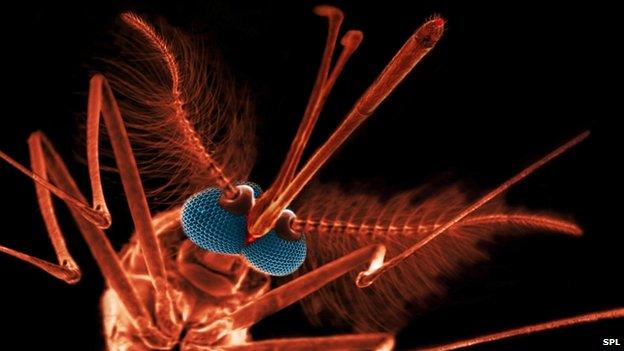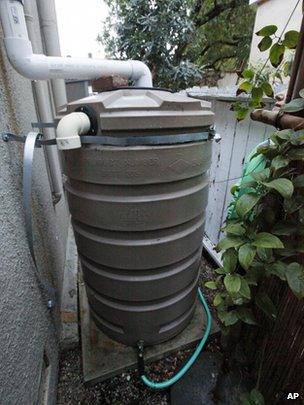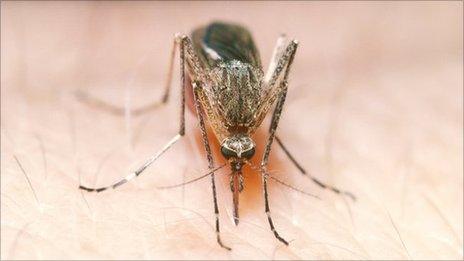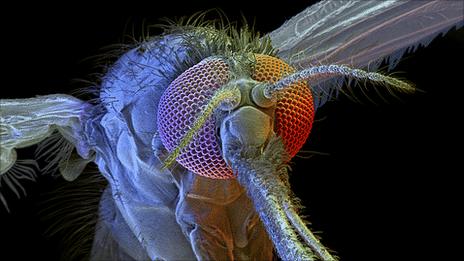Study: UK cities becoming mosquito-friendly habitats
- Published

A greater abundance of mosquitoes that act as vectors of human diseases are living in close proximity to people's homes
Changes to UK urban areas provide habitats for mosquitoes, including species known to spread malaria and West Nile virus, a study suggests.
Warmer ambient temperatures and more water containers in gardens are bringing mosquitoes into closer contact with people, say scientists.
UK mosquitoes are human disease-free but the team says more of the insects breeding in urban areas increases the chances of a potential outbreak.
The findings appear in Plos One, external.
Co-author Amanda Callaghan, an associate professor at the University of Reading's School of Biological Sciences, explained that the study aimed to collect data to see if there was a difference in abundance and diversity of mosquitoes in rural and urban locations.
"We knew that there was an urban heat island effect, and changes in temperature have been known to cause changes in mosquito behaviour and - in some regions, such as southern Europe - diseases have crept into these countries because mosquitoes have changed their behaviour," she said.
Habitat boom
Writing in their paper, Dr Callaghan and colleague Susannah Townroe observed: "Within the UK, [water butts - a container for rainwater] are becoming increasingly common in residential gardens.
"A severe drought and subsequent hosepipe ban in the spring of 2012 across southern and eastern England led to reports of hugely inflated sales of water butt containers," they added.

The number of water containers continues to grow as households look to save money and water
"Water butts collect rain from roof guttering along with vegetation, animal detritus... providing both a habitat and food resource for mosquito larvae."
They explained that while individual containers were relatively small, when all the water butts in the area were combined, it represented a "large area of habitat" for breeding mosquitoes.
The authors added: "This, in combination with the [urban heat island] effect... may favour mosquito larval production in urban habitats."
In order to test this idea, the researchers placed water containers in a number of urban and rural residential gardens.
"We found fewer species of mosquitoes in urban environments compared with rural environments, but the species that were there were much more abundant," Dr Callaghan told BBC News.
"The one that was most abundant is called Culex pipiens, and in other countries C. pipiens carry diseases such as West Nile Virus."
The other species of mosquito that the researchers found in the study's water containers was Anopheles plumbeus, which has been shown to be a "reasonably good vector of malaria".
Dr Callaghan said: "The main finding is that these mosquitoes are right next to people's houses and the Anopheles mosquito we found is a human-biting species and it can transmit malaria.
"Therefore, if someone comes back from their holiday with malaria and they get bitten, it could be transmitted to another person - and that is how you get outbreaks.
"The chances of there being a malaria epidemic in this country at present are relatively low because there has not been secondary malaria here since the 1950s."
Secondary malaria refers to someone catching malaria from another person who has also been bitten by a mosquito.
"I am not saying we are all going to get diseases because we have vectors here, but it is worth keeping an eye on."
Changing behaviour
More than 30 different mosquito species have been recorded in the UK, most of which are resident all year round.
"In rural areas you get more types of mosquito - there are lots of different types of habitats and different species of mosquito like different types of habitat - some of them will favour ditches, others will favour ponds or tree holes etc," Dr Callaghan explained.
"Whereas if you go into an urban environment, you do not have a lot of those habitats so you get a different picture of what species can survive in this environment.
"The Culex pipiens is a well-known urban mosquito, but the Anopheles plumbeus is normally considered to be a tree-dwelling species. But it is changing its habitats from breeding in tree-holes to breeding in man-made water containers.
"This is concerning considering that it is a vector of malaria."
Dr Callaghan said there were thousands of cases of malaria in the UK each year, mostly as a result of people returning from areas of the world where malaria was present, but people were usually quickly treated.
"If malaria is not in your blood for any length of time, the chances of you being bitten and transmitting it are quite low," she said.
"But if more people come back with malaria and there are more mosquitoes that can transmit malaria living by you then that chance increases."
- Published23 August 2011

- Published21 April 2011

- Published14 September 2010